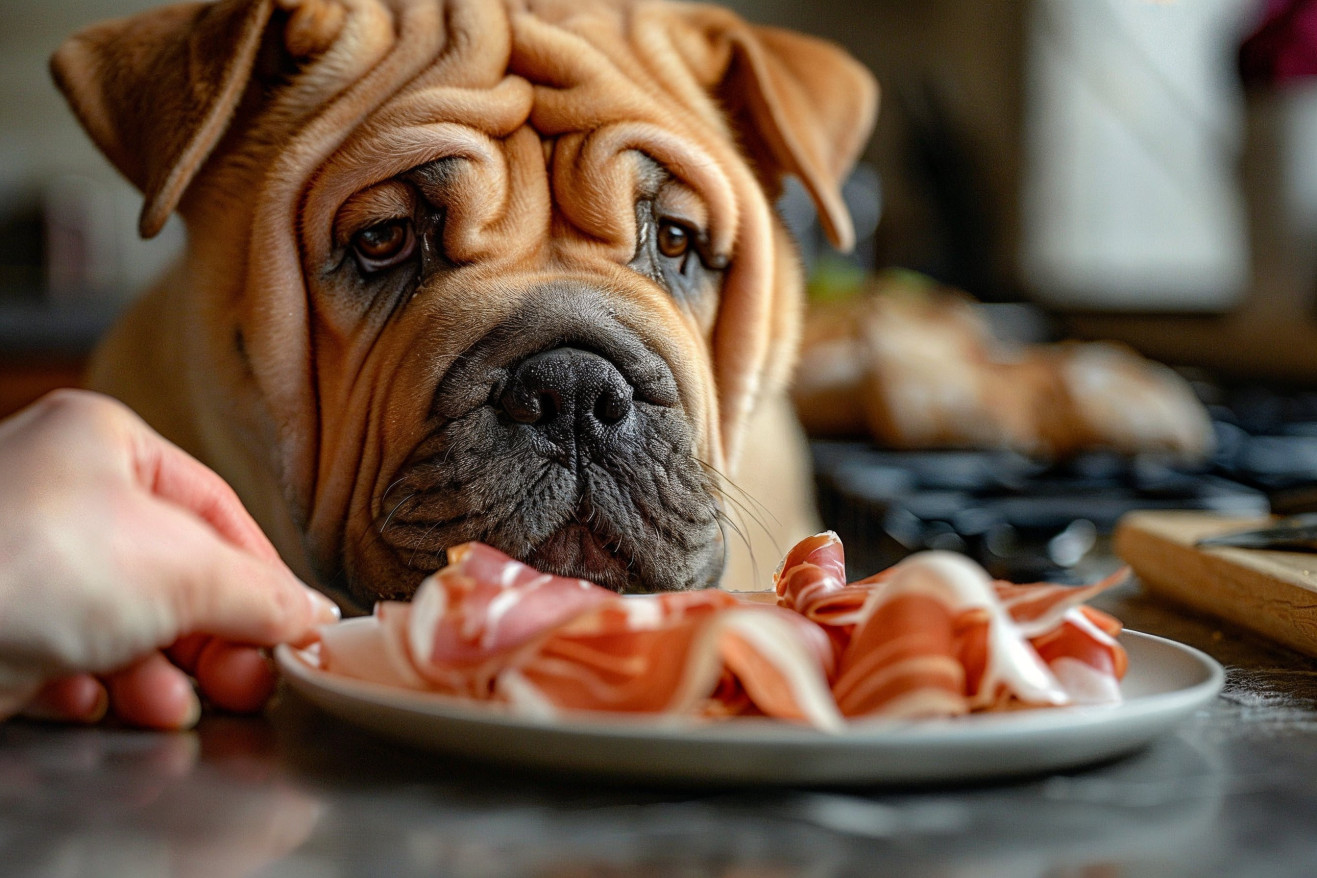Can Dogs Eat Prosciutto? A Vet Weighs In on This Salty Snack
3 April 2024 • Updated 1 April 2024

Despite the pleading eyes of our furry friends, it’s important to know the potential dangers and serving sizes before giving in and letting your dog have a bite of prosciutto. While prosciutto is safe for dogs to eat in moderation, it’s high in fat and salt and can cause health problems like pancreatitis and obesity if it’s eaten in large quantities. That said, a little bit of prosciutto here and there is fine and a good rule of thumb is to limit it to a few thin slices.
While it’s best to err on the side of caution when it comes to feeding your dog prosciutto, there are some studies from veterinary nutritionists and animal behaviorists that can help us better understand how it fits into a dog’s diet.
In the following sections, we’ll take a look at research that’s been done on the nutritional content of prosciutto, how much you should feed your dog based on their breed and size, and advice from experts on the best ways to introduce your dog to this rich snack. By the time you’re done, you’ll have a good idea of when and how to give your dog this Italian cured meat.
Can dogs eat prosciutto?
Salt Toxicity in Dogs
In addition to the deliciousness of prosciutto, the high salt content can lead to salt toxicosis or hypernatremia in dogs - a condition that can be fatal. As the AKC explains, too much sodium causes water to move from cells to the blood, leading to tissue and neurological damage. Signs of salt poisoning include increased thirst, vomiting, diarrhea, lethargy, lack of coordination, seizures, and even coma, according to the Animal Emergency Service.
Smaller dogs are at a greater risk, with a toy breed dog potentially experiencing toxicosis after ingesting less than a teaspoon of salt, while a giant breed dog may be able to handle more than four tablespoons, according to the AKC. Given the salt content of prosciutto, even small servings can be dangerous for small dogs. If you suspect salt poisoning, FetchPet and Vetster stress the importance of getting your dog to a vet right away, as the condition can be treated if caught in time with interventions like IV fluids and observation - but it can be fatal if treatment is delayed.
In addition to protecting your dog from the dangers of prosciutto’s saltiness, the meat’s high fat content poses another risk.
Pancreatitis and Obesity Dangers Due to Prosciutto's High Fat Content
The high fat content of prosciutto also presents another major danger to dogs: pancreatitis. According to K9 Magazine, prosciutto is a high-fat cured meat, and overeating it can lead to this painful and potentially life-threatening condition. As Outward Hound points out, pancreatitis can be caused by high-fat foods like prosciutto, and it leads to vomiting, diarrhea, dehydration, and metabolic disturbances. Veterinary care is needed immediately, as pancreatitis can become severe very quickly.
In addition to causing pancreatitis, the high fat content of prosciutto can also lead to obesity in dogs, which can cause a number of other health problems. Outward Hound explains that obesity in dogs can lead to diabetes, joint issues, and breathing problems. As the AKC explains, just like in people, too much fat in a dog's diet is unhealthy and can lead to serious digestive problems.
It's important to be mindful of the amount of high-fat foods like prosciutto that you give your dog. Focusing on leaner sources of protein and healthier treat options can help ensure that your dog maintains a healthy weight and doesn't face the many dangers of obesity and pancreatitis.
Healthier Protein Options and Other Safe Treats for Dogs
While prosciutto is best avoided as a regular treat, there are plenty of healthier protein options and other treats for dogs. Lean meats like cooked chicken, turkey, and fish can offer dogs important proteins and other nutrients without the high salt and fat content, according to Stella & Chewy's. Plant-based proteins like quinoa, chickpeas, and green peas can also be added to a dog's diet to give them some variety, says Dog Nutrition: 7 Best Protein Sources for Dogs.
Fresh fruits and vegetables, such as carrots, apples, and sweet potatoes, are great low-calorie treats for dogs, according to Raleigh Vet. They can also offer important vitamins, minerals, and fiber without the potential dangers of high-fat, high-sodium cured meats like prosciutto. By focusing on a well-rounded diet and making sure to include a range of healthy protein options and low-calorie treats, you can help make sure your dog stays healthy and happy.
Moderation and Portion Control: How to Safely Feed Prosciutto to Your Dog
In general, most healthy adult dogs can have prosciutto as an occasional treat in moderation, but it should not be a regular part of their diet. Spoiled Hounds recommends a few thin slices, noting that larger dogs may be able to handle a little more than smaller dogs. Prosciutto should be introduced slowly, and pet parents should watch for signs of digestive issues or other adverse reactions.
It's important to consider the salt and fat in prosciutto when calculating a dog's daily caloric and nutritional needs. Hepper and Dogster both point out that even small amounts of this high-sodium, high-fat cured meat can lead to salt toxicity and pancreatitis. That's why portion control and close monitoring are important when feeding prosciutto as an occasional treat.
While prosciutto may be okay for most healthy adult dogs in small amounts, there are other treats that are less risky, and there are also times when it's best to avoid giving dogs cured meats altogether.
So, Can Dogs Eat Prosciutto?
While prosciutto and other cured meats are not recommended for dogs, there are some options for pet parents who want to give their dogs a special treat. According to Salumi Pasini, cooked ham and turkey breast can be given to dogs as long as the fatty parts are removed. However, these treats should be given in moderation.
On the other hand, highly processed and cured meats like bacon, salami, and sausages should be avoided due to their potential toxicity and health risks. As PetHelpful notes, bacon and other high-fat, salty cured meats can lead to pancreatitis and other health issues in dogs.
In general, it’s best to limit or avoid giving dogs any processed or cured meats and stick to fresh, lean protein sources. This way, you can make sure that you’re providing your dog with a balanced diet and making responsible treat choices that support their health and well-being.


